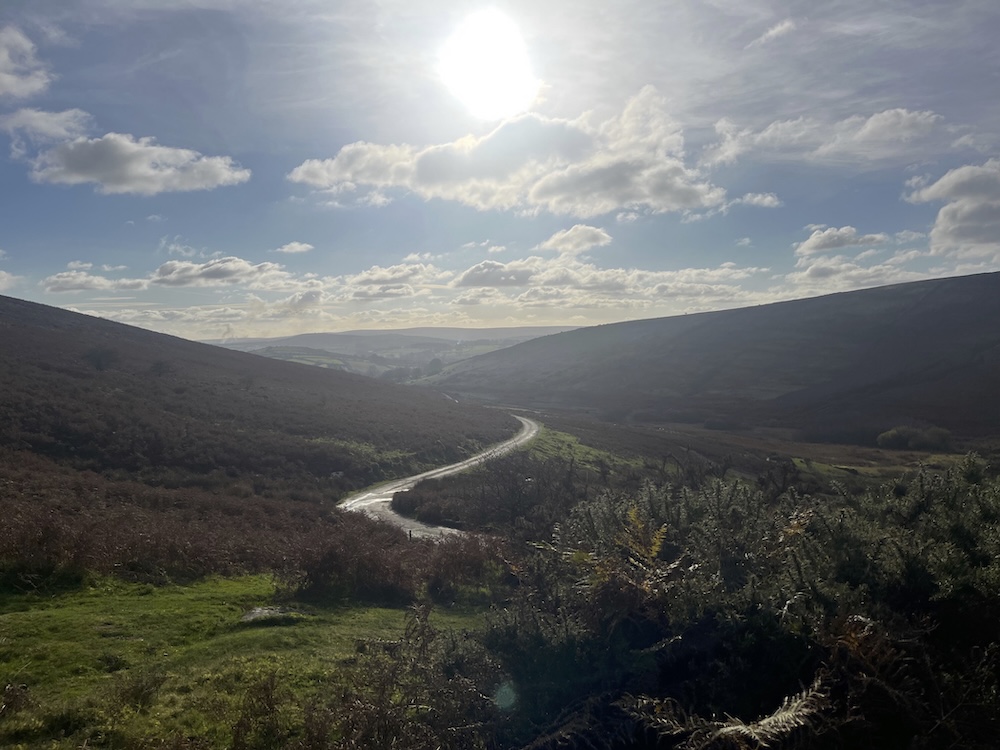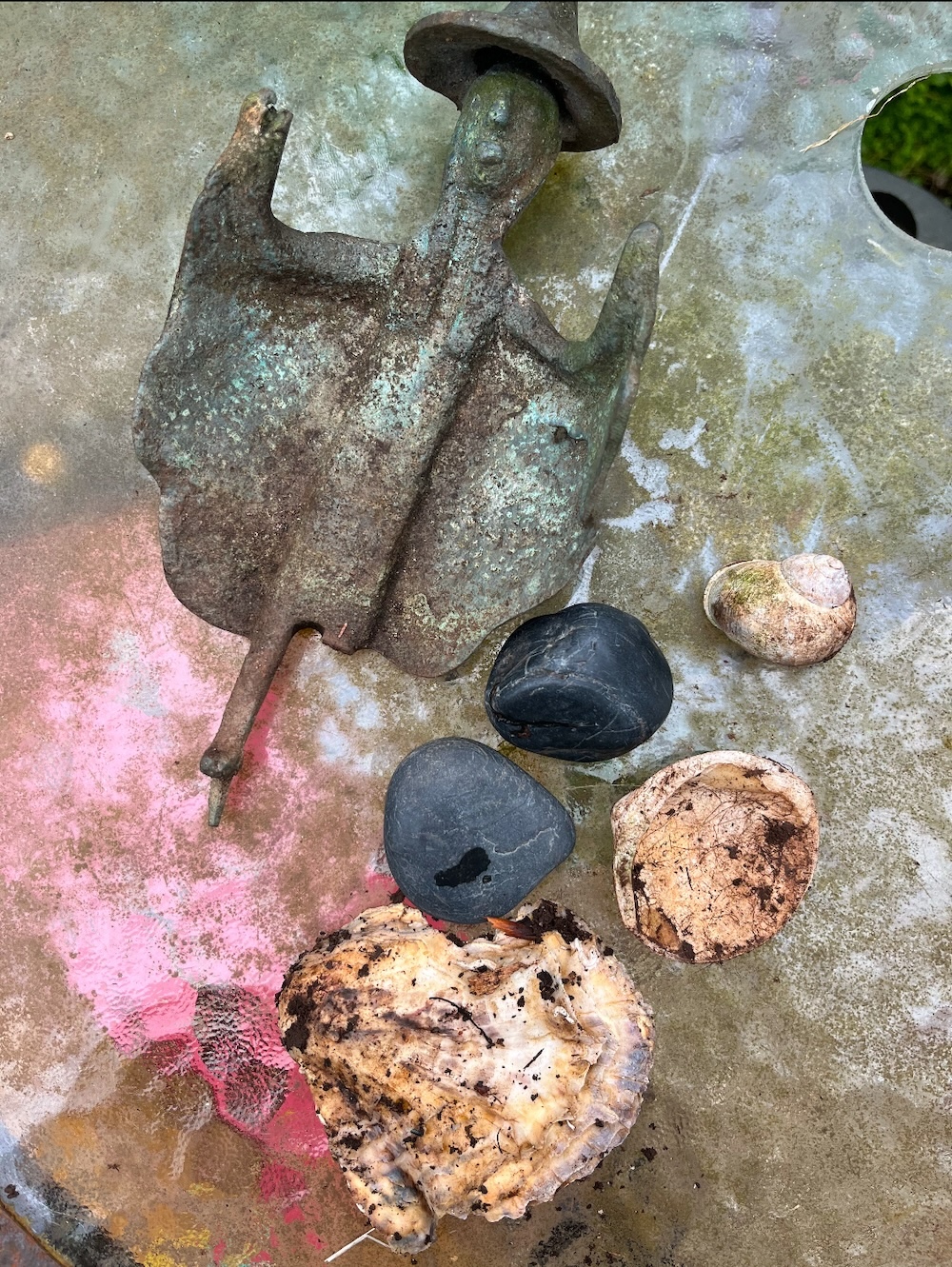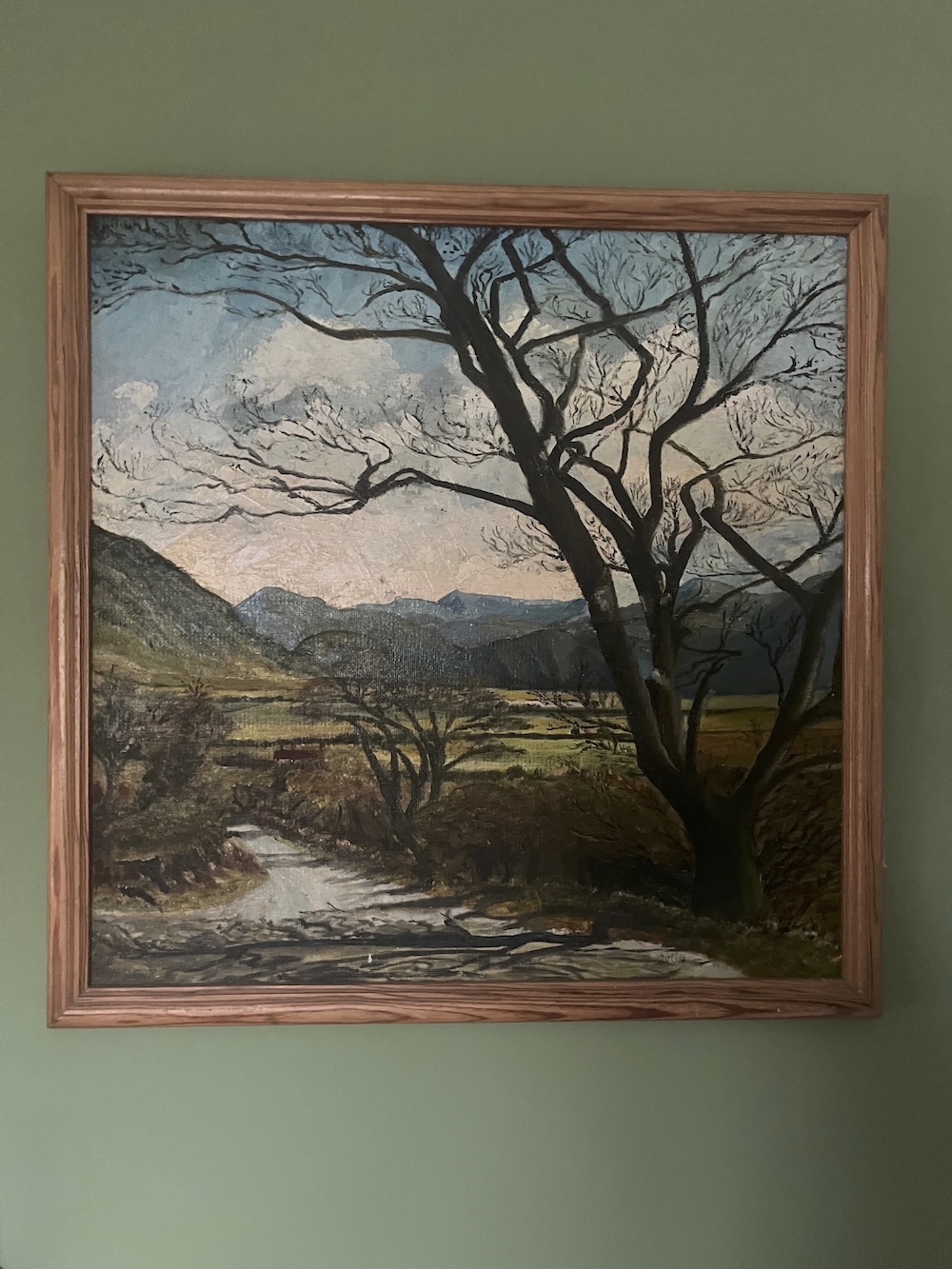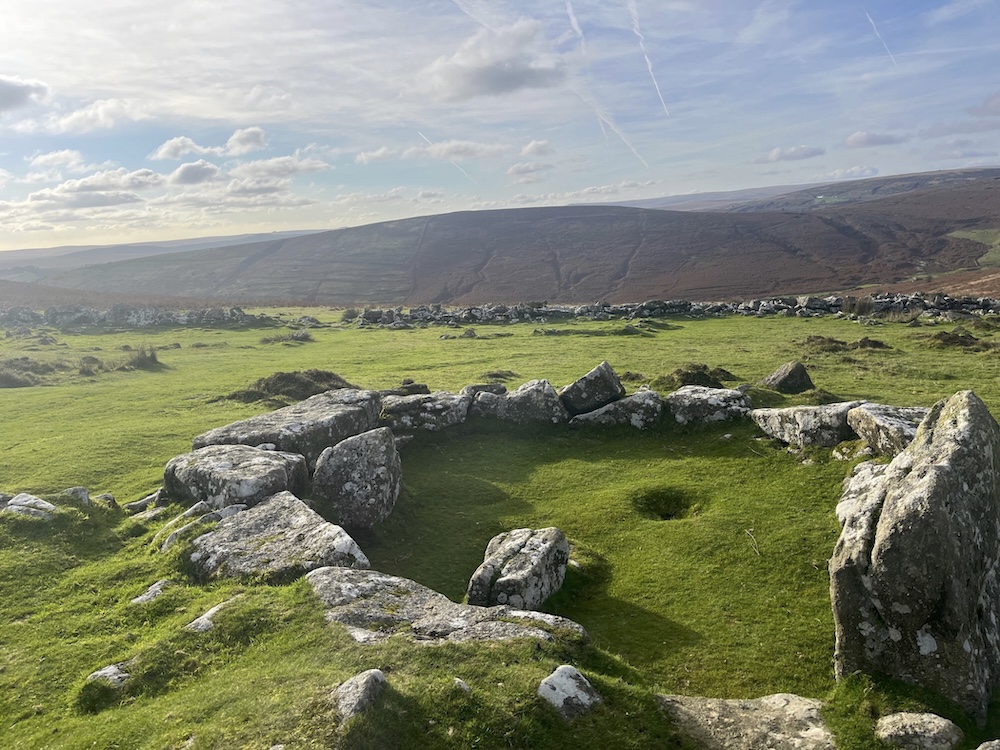Winter’s skeleton trees reveal untold stories to Kirsteen McNish.

To travel the world explicit
in its fault and fold.
To enter the background
as each thought discards itself:
pine-needles to the tree-line,
scree beyond.
To move small, sleep low
and dream new depths
of emptiness and order.
To be troubled by neither.
– Lavinia Greenlaw
I wake in the dark around 6am, and walk to the front window to see a bloom of liquid blue light starting to spread behind the hills. One dwelling is forever lit up on the brow of the hill no matter what time I wake, like the house itself is fearful of the dark. I don’t know what I am looking for in the skies each night, but I search them anyway. I have caught sight of shooting stars and satellites, distant flashes of aircraft, and the moon’s search-beam, which makes the ash tree in the garden a ballet dancer in the dark.
I often hear a low buzz at night in this house that everyone in my household is impervious to. I thought at first it was the fridge burring, the kitchen extractor fan, night-time tinnitus, cables criss-crossing outside the house, or unearthed electricity. No one else, it seems, can hear it. Or at least that’s what I think, until I discuss it with my neighbour as he works outside, rollie held tight between his lips as he talks, his beanie low on his forehead buffering the cold. He tells me he can feel a low rumbling through his chair feet every now and then when he sits with his dinner on a tray after work. I decide it’s the quarry out back a few doors down — the hill still mourning its deep cut — but I have absolutely nothing to base this on. Why too wouldn’t a place with so many rolling hills rumble like the encroaching tide? This quiet place 400 feet above sea level is still in part a mystery to me, and I won’t pretend to know all its secrets.
Autumn has been about maintaining the tension in the wires. I fear that this run of bad luck we are having can be sensed by others and recoiled from, in case it’s catching. I stop sharing things and quieten. I feel things slipping and part of me just wants to let go, see where this wind takes us.
I think of my well-thumbed copy of Damian Le Bas’ Stopping Places as we drive through the lanes. Settlements on specific grass verge hedgelands — clusters of round wooden yurts, caravans, repurposed military vehicles, horse boxes, and in one place a tiny garden of tulips and spring onions — almost breach over the road like a wave overlapping a sea wall. These ribbons of land are cheek-by-jowl with the tarmac; dramatic views and a road that beckons. I look forward to the familiarity of these sites studding the lay-bys; it feels unique somehow to this part of Devon. My late mother’s name before she was wed, I was told by a genealogist, was a commonplace old traveller’s name, but I am reminded that her own energies pulled back to Nottingham to her mother and siblings and the places she spoke of — the Hemlock Stone, The Palais, the buzz of the ice-skating rink. I can almost taste the sharp fruit’s flesh on my own tongue as I think of her eating a pomegranate — piercing each seed with a pin at Goose Fair amongst the din of rides and the smell of burnt toffee.
Things here seem to disappear and re-appear. The old battered bronze witch-like figure I found buried with black pebbles and oyster shells in the garden wall disappears from its new perch for months, and after searching for weeks I give up — only for it to re-appear months later, its cold stubbled greenish metal standing out amongst the gravel. We are told by a friend it looks like an ancient Sardinian figure, and I am perplexed as to how it got here, secreted in the mossy walls that haphazardly tumble from our garden. The boundaries of the moor and the roads bleed into each other where water churns and the wind has broken the defences — hedges are scattered apart in a wicker of sticks. As late autumn fades the old Primrose Line railway bridges that were covered in foliage are being shored up and cleared of debris — the train tracks long gone but once ran happily through the Avon Valley’s steep fields to the estuary at Kingsbridge. My neighbour V, who has lived here all her life, tells me as a child if she was running late to be picked up at the old Avonwick station stop, and the driver saw her, he would stop the train and swing her tiny frame up onto his cab from the road. Winter, and its skeleton trees, reveal snippets of stories untold.

I hear from people with tantalising creative projects which fail to take flight, and I withdraw bids made too quickly in the heat of uncertainty. I welcome a string of near-constant visitors, whisking up a making of beds, meals, hearth fires, bonfires and lists of places to visit, from moorland stargazing to sea edges. When I berate myself at night for my skittish energy, I close my eyes and imagine desire-line patterns we are making like sine waves etched into glass; our own haphazard invisible constellation maps.
In the space of one week, we have three sets of visitors, their shoulders almost grazing as they come and go. I am too caught up in preparations to see I am spinning out, heightened by sitting at a laptop too late in the evening. One morning, as I walk backwards down the stairs guiding my disabled daughter, as I do every day, I lose my footing. For a split second I realise both my feet are off the top step. My hand somehow lets go of my daughter’s, and I clatter down the full flight of stairs like jenga pieces falling from a broken box. In the car, we speed to the hospital and an eerie calm envelops me as I dissociate. I think of my late sister. I fret about leaving my friend A at the house, who had only just arrived with her family in the dark. In the chaos of A&E I am assessed quickly and my partner leaves to calm down my daughter, who has started shouting and waving her arms around like a scarecrow in a storm, whilst my son gently grips my hand, stroking his thumb, pulse-like over mine. I hold a towel to my head and try to stay calm. In the CT room, as the machine clicks into gear, it reminds me of the click-click of the starlings chattering in our eaves. As I am scanned I think of my solitary boy, alone outside and anxious in the moonscape of a strip-lighted corridor. He has intuited to call my friend S, and she soon arrives. I spy the necklace I bought her, with a tiny gold and silver lemon charm for her sharp wit, resting on her sternum. I search for her reassurance as she holds my hand and the suturist laughs heartily at her quick-fire humour. I realise I am rarely in my body, and always three steps down the footpath in my head, which is likely why I fell. As my partner returns and helps me concertina into the car, a laden quiet settles between us like a blanket of snow. Turning out of the carpark Joan As Police Woman comes on the radio; these lines arcing as he does a three-point-turn around the ambulances
It’s true what they say about me
That I’m out of my mind, but I think that you like it.
As I rest fitfully in bed, rivers burst their banks, tides are high and I dream of water rising through concrete and stone, my legs knee-deep in the levels. I am caught up like sheep’s wool in the briars whilst concussion ties me to the house. Screens make me dizzy, new risk averseness makes a basket-case of my usually quick movements, and I speak and move with a new slower uncertainty. The nocturnal buzzing noise, though, has gone. I shuffle around the house like I have a cloth under each foot, cleaning the floor. After removing an awkward set of ten stitches, the nurse softly holds my arm and tells me to give myself time to compute what has happened.
The first time I go outside after two weeks cloistered in my room we just go to the top of the hill in the car — and my chest lifts like a kite to see a huge cloud of starlings murmurate silently and then settle again on the telephone wires, chattering like an audience before the theatre curtain is drawn. Swathes of light sweep across the hills, revealing depth of colour in a kind of song. The kids sit in the car vaporising the windows, Sonic Youth rattling the speakers as the starlings go quiet and lift once more in sync with Kim Gordon’s voice. We drive on to the carpark at South Milton Sands. The others get out the car and go down to the beach and I sit inside and admire a kestrel’s small body watchfully hovering above the banks, holding its own in fierce squalls.
My sense of smell and taste has sharpened, and my dreams are increasingly off the charts. I dream of someone I once loved walking towards me with sticks in his hand, scattering them before me and demanding I read them like runes. I dream of long-forgotten friends from primary school in strange places I know are “off the map”. I dream of the nighttime sea, dark and glowering, the water drifting over me. I dream in the daytime when I can’t stay awake. I dream almost all the time.
A couple of weeks later my partner stops off enroute in Ashburton as I get motion sick. I am, however, determined to go onwards to Grimspound settlement for the first time for research. I stop at the little shop opposite the Conservative Club, where men in tight jeans and unseasonable t-shirts smoke furiously, plumes of smoke curling vampishly into the damp air. Painting and pottery congregate in stacks as if they are whispering to each other on the pavement, and the shop door fizzes with objects like a burst bottle. The shopkeeper approaches me to say hi, his soft brown-flecked eyes tender as he asks how my daughter is. I tell him she’s been off-centre since my fall and he suddenly draws me in toward him. It takes me a moment to recognise that it’s my tears blotting his tan jacket in inky stains, my head resting on his shoulder like a rock settled in a field. Leaving moments later with a bargain of an oil painting from the front of the stack, I look at it on my lap and fancy I can feel the tree in the foreground moving against the looming tors. I feel like I am breaching the surface after a time submerged in the cold folds of my bedroom.

We drive up to the remains of the Grimspound settlement near Postbridge. The air is as sharp as a lime. This part of Dartmoor is a first for me and I am treacle-slow walking up a path I would normally eagerly stride in anticipation. We reach the remains of the Bronze Age circle and walk into its cluster of inner chambers, and I peer through the gaping stones at what must have been a grand entrance at one time. I wonder who was announced at this gateway or worshipped here. Much has been surmised over centuries that this place was once a witch’s enclosure, a Druidic temple, a place to safeguard livestock from wolves, or a hilltop defence structure. It’s enough today to dismiss all this and take in its epic vista. I could stay here, like this, stock-still, for a long time, my face stinging in the wind. It has a strange sound; a bouncing echo like the hills where I live; the effect of someone shouting down a cardboard tube — distant and yet somehow close and rounded. The medieval strip lynchet fields I am facing ascend skyward like burnished waves and the long road snakes away down the valley, fluid and molten silver. I count the colours of the fields as they saturate me — purple, ochre, green, bronze, peat, gold, and crimson. In this moment I feel something returning within me, rising and falling like my breath. I relinquish my grip and let go.
